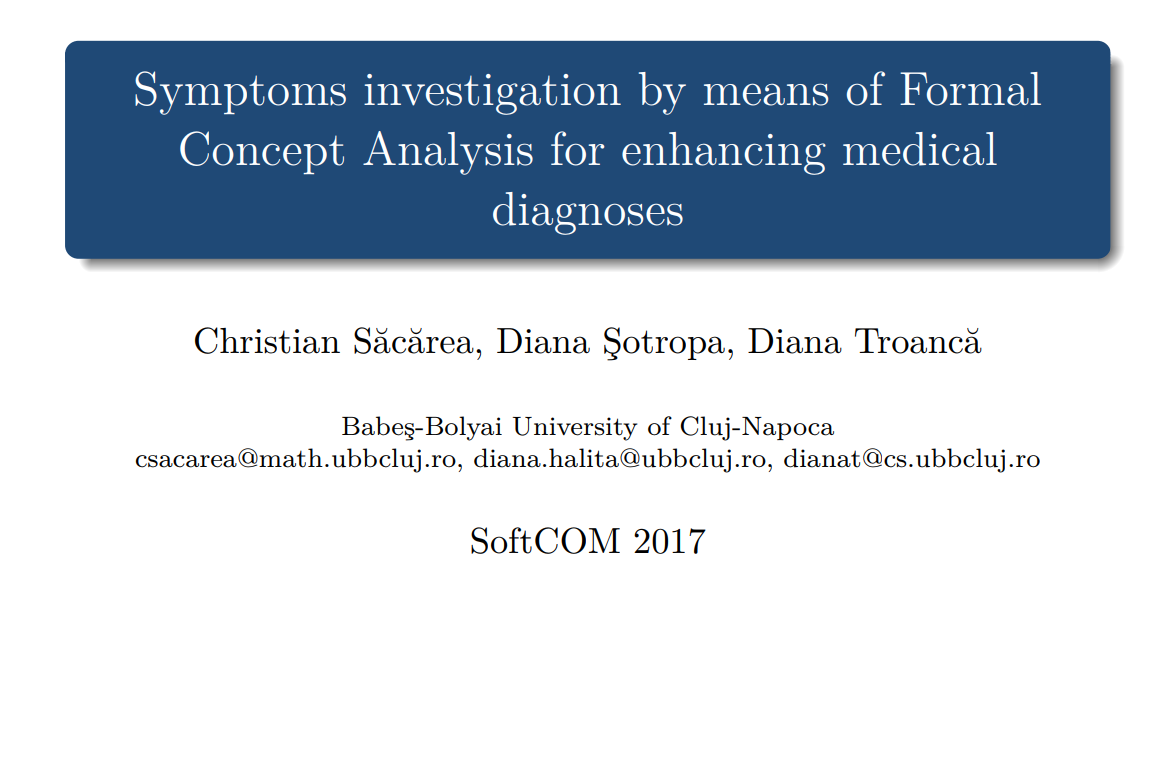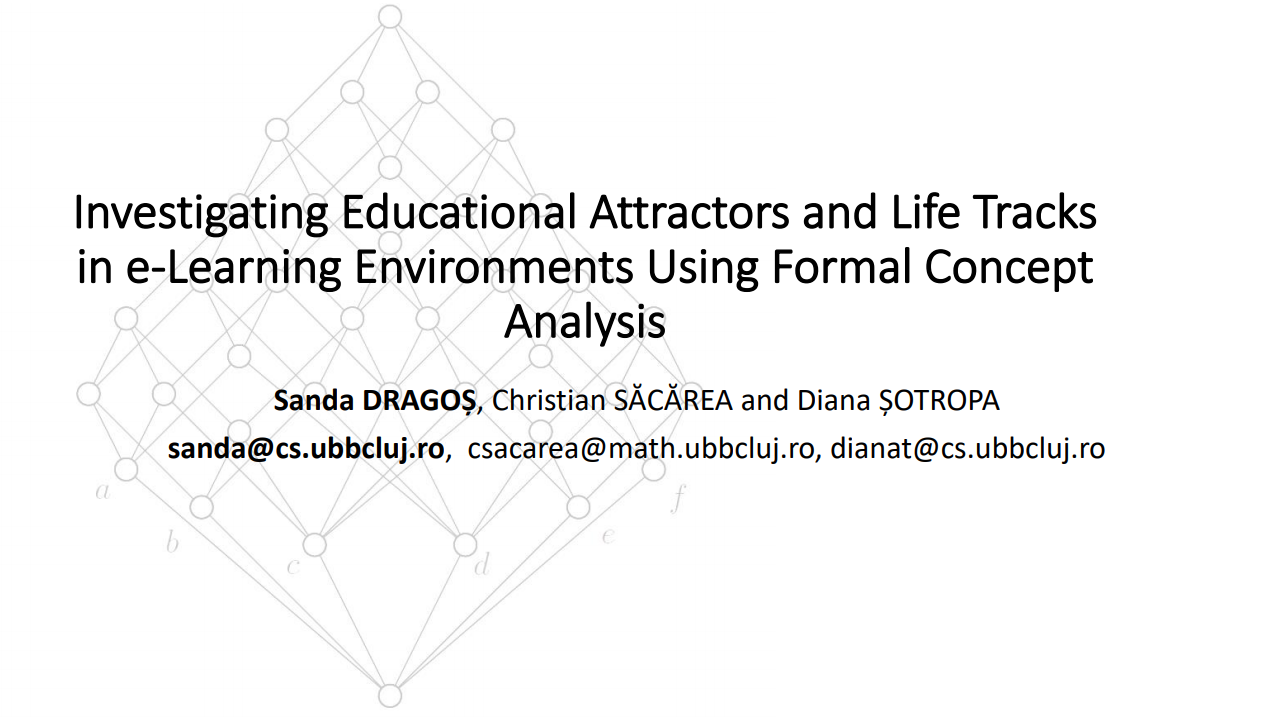Abstract:
Pattern extraction is one of the major topics in Knowledge Discovery. Out of numerous data mining techniques we propose to use a new approach: Formal Concept Analysis (FCA) together with Graph Databases with the implementation Neo4j. FCA is a prominent field of applied mathematics using maximal clusters of object-attribute relationships to discover and represent knowledge structures. The use of FCA gained much importance in many research domains in recent years. Despite the similarity of the graph representation between FCA and Neo4j, the structure and relations among the elements are represented differently and can offer a different perspective on the analysis.
This paper gives more insight into how patterns can be extracted from medical data and interpreted by means of FCA and Neo4j in order to help medical staff improve the accuracy of diagnoses. We examine the factors related to patients' symptoms and diagnostics and then compare the results with the ones provided by a medical care center.
We apply knowledge discovery techniques and conceptual landscapes paradigm in order to obtain an in-depth and high qualitative knowledge representation of medical data.
By making use of the effectiveness and the graphical representation of conceptual hierarchies we extract valuable knowledge from medical data sets through which we solve the knowledge discovery, processing and representation task in Electronic Health Record systems.
About
Activities
FCA Tools Bundle
FCA Tools Bundle is a website containing a collection of tools that can be used for conceptual structure analysis.
Research Seminars - Academic year 2017-2018
Usually the meetings are held in 406 room, 58-60 Teodor Mihali street, each Monday at 14:00.
Publications
Keywords:
Formal Concept Analysis, Electronic Health Record, medical data, many-valued contexts, conceptual scaling, Triadic FCA, Neo4J
Investigating Educational Attractors and Life Tracks in e-Learning Environments Using Formal Concept Analysis
Abstract:
E-learning platforms are widely used in modern education. While in the traditional education the instructor does not have a comprehensive insight on how his students are using the educational resources, the situation is different for online learning environments. Web usage logs comprise a variety of information regarding the visited pages. These web-logs become a rich resource for data analysis. Understanding usage patterns from web-logs is widely used in order to improve web-based applications. In our research we are interested in distilling valuable knowledge on users behavior in online educational platforms using the knowledge discovery and processing methods of Formal Concept Analysis (FCA). This knowledge can then be used to understand how students are using the educational resources, to gain insight on their online behavior as well as how they use these resources over time. In this paper, we focus on the detection of behavioral patterns in web-based e-learning environments and on how users adhere to intended educational attractors. For this, we first use FCA to investigate so-called educational attractors and then distill users life tracks using Temporal Concept Analysis. We exemplify the developed methods on a locally developed e-learning platform called PULSE.
Keywords:
Life tracks, Temporal Concept Analysis, Web logs analysis, Conceptual structures, User behavior, Attractors
Navigation and Exploration Tool for Polyadic FCA
Abstract:
Formal concept analysis (FCA) is a powerful mathematical tool that allows deriving concept hierarchies from large sets of data in order to analyze data and derive meaningful information from it [3]. FCA finds practical application in fields including data mining, text mining, machine learning, knowledge management, semantic web, software development, chemistry, biology and many more. FCA works with contexts and concept lattices derived from them. Since navigation in three-dimensional spaces is rather difficult, one method of navigation in
tricontexts uses local projections and reduces the triadic contexts to multiple dyadic contexts. The purpose of this paper is to present FCA Tools Bundle, which is a collection of tools for dyadic and triadic formal concept analysis. Furthermore, in this paper, we describe the architecture of the tool and the technologies used in its implementation.
Keywords:
FCA, Triadic Context, Navigation Tool, Concept Lattice
FACT – A Tool for Temporal Formal Concept Analysis
Abstract:
Formal Concept Analysis offers an elegant, intuitive and powerful graphical representation of landscapes of knowledge as concept lattices.
In this paper, we report about the current state of FACT, a tool for temporal data analysis and knowledge discovery. FACT is a web-based application which allows an online interaction with larger data sets in order to explore and analyze data conceptually. It uses concept lattices in order to extract knowledge from the data set. After presenting the tool itself we shortly describe an example and present the planning for further development.
Keywords:
Life tracks, Temporal Concept Analysis, Web logs analysis, Conceptual structures, User behavior, Attractors
Activities
FCA Tools Bundle
FCA Tools Bundle is a website containing a collection of tools that can be used for conceptual structure analysis.Research Seminars - Academic year 2017-2018
Usually the meetings are held in 406 room, 58-60 Teodor Mihali street, each Monday at 14:00.
Keywords:
Formal Concept Analysis, Electronic Health Record, medical data, many-valued contexts, conceptual scaling, Triadic FCA, Neo4J
Investigating Educational Attractors and Life Tracks in e-Learning Environments Using Formal Concept Analysis
Abstract:
E-learning platforms are widely used in modern education. While in the traditional education the instructor does not have a comprehensive insight on how his students are using the educational resources, the situation is different for online learning environments. Web usage logs comprise a variety of information regarding the visited pages. These web-logs become a rich resource for data analysis. Understanding usage patterns from web-logs is widely used in order to improve web-based applications. In our research we are interested in distilling valuable knowledge on users behavior in online educational platforms using the knowledge discovery and processing methods of Formal Concept Analysis (FCA). This knowledge can then be used to understand how students are using the educational resources, to gain insight on their online behavior as well as how they use these resources over time. In this paper, we focus on the detection of behavioral patterns in web-based e-learning environments and on how users adhere to intended educational attractors. For this, we first use FCA to investigate so-called educational attractors and then distill users life tracks using Temporal Concept Analysis. We exemplify the developed methods on a locally developed e-learning platform called PULSE.
Keywords:
Life tracks, Temporal Concept Analysis, Web logs analysis, Conceptual structures, User behavior, Attractors
Navigation and Exploration Tool for Polyadic FCA
Abstract:
Formal concept analysis (FCA) is a powerful mathematical tool that allows deriving concept hierarchies from large sets of data in order to analyze data and derive meaningful information from it [3]. FCA finds practical application in fields including data mining, text mining, machine learning, knowledge management, semantic web, software development, chemistry, biology and many more. FCA works with contexts and concept lattices derived from them. Since navigation in three-dimensional spaces is rather difficult, one method of navigation in
tricontexts uses local projections and reduces the triadic contexts to multiple dyadic contexts. The purpose of this paper is to present FCA Tools Bundle, which is a collection of tools for dyadic and triadic formal concept analysis. Furthermore, in this paper, we describe the architecture of the tool and the technologies used in its implementation.
Keywords:
FCA, Triadic Context, Navigation Tool, Concept Lattice
FACT – A Tool for Temporal Formal Concept Analysis
Abstract:
Formal Concept Analysis offers an elegant, intuitive and powerful graphical representation of landscapes of knowledge as concept lattices.
In this paper, we report about the current state of FACT, a tool for temporal data analysis and knowledge discovery. FACT is a web-based application which allows an online interaction with larger data sets in order to explore and analyze data conceptually. It uses concept lattices in order to extract knowledge from the data set. After presenting the tool itself we shortly describe an example and present the planning for further development.
Keywords:
Life tracks, Temporal Concept Analysis, Web logs analysis, Conceptual structures, User behavior, Attractors




